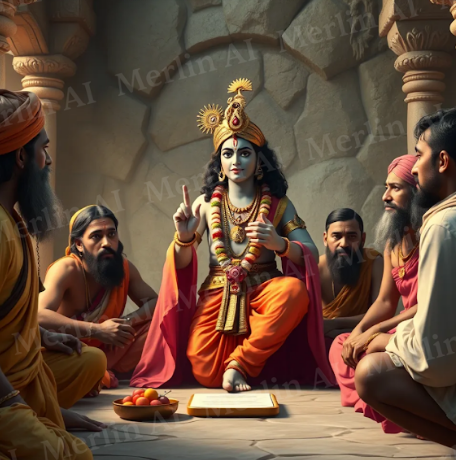
By-Adv Praful S Potdar
“Sukha-duḥkhe same kṛtvā lābhālābhau jayājayau, Tato yuddhāya yujyasva naivaṁ pāpam avāpsyasi.”
(Bhagavad Gita 2.38)
“Treating alike pleasure and pain, gain and loss, victory and defeat, engage in battle for the sake of duty; in this way, you will not incur sin.”
Conflict is an inevitable part of life, but how we handle it defines our journey towards harmony and peace. In the Bhagavad Gita, Lord Krishna provides Arjuna with profound wisdom on navigating the complexities of conflict. These teachings, though delivered on a battlefield, apply to our everyday struggles and disagreements, offering timeless guidance for resolving conflicts with grace and understanding.
Understanding Conflict: What’s Really Going On?
Before diving into solutions, it’s essential to understand what conflict truly is. Imagine a meeting where two team members are at odds over a project’s direction. Frustrating, isn’t it? This scenario mirrors the internal conflict Arjuna faced before the battle of Kurukshetra. Krishna teaches us that to resolve conflict, we must first understand its root causes. The next time you find yourself in a disagreement, take a step back and identify what’s really at stake for each party involved. What are their underlying needs, fears, and concerns?
The Power of Dialogue: Let’s Talk It Out
Consider the dialogues between Krishna and Arjuna. These conversations are a testament to the power of open communication. In the heat of conflict, it’s easy to jump to conclusions or make assumptions about the other person’s intentions. Instead, initiating a dialogue—much like Krishna did with Arjuna—can lead to clarity and resolution. Imagine mediating a family dispute over inheritance. Encouraging everyone to express their feelings can help clear up misunderstandings and foster a fair resolution. How might you approach a difficult conversation with someone you care about?
Emphasizing Dharma: What’s Your Duty?
Dharma, or righteous duty, is a cornerstone of Krishna’s teachings. When faced with difficult choices, like a business leader torn between profit and sustainability, considering one’s duty to others can provide guidance. Dharma reminds us that resolving conflict isn’t just about personal interests; it’s about considering the greater good. The next time you’re faced with a tough decision, ask yourself: What is my duty here? Reflect on a time when you had to balance your needs with those of others—how did your sense of duty guide you?
The Power of Detachment: Letting Go of Outcomes
Krishna advises Arjuna to focus on performing his duty without attachment to the results. This principle of detachment can be transformative, especially in high-pressure situations. Imagine working in a competitive environment where stress and tension are rampant. Instead of fixating on the outcome, such as a promotion, focus on doing your best work. This mindset shift can lead to a more collaborative atmosphere and reduce stress. Have you ever felt relieved by letting go of your attachment to the outcome?
Compassion and Forgiveness: The Heart of Resolution
Compassion lies at the heart of Krishna’s teachings. He encourages us to understand and empathize with others, even those we disagree with. Consider the example of the Truth and Reconciliation Commission in South Africa, where fostering understanding and forgiveness played a crucial role in healing a divided nation. In your own life, think of a time when showing compassion transformed a conflict into a meaningful conversation. How can you apply this principle to your current relationships?
Conclusion: Your Path to Peaceful Conflict Resolution
As we conclude this journey through Lord Krishna’s teachings, remember that conflict doesn’t have to be a battlefield. By embracing open dialogue, adhering to your Dharma, practicing detachment, and cultivating compassion, you can navigate disagreements with grace and understanding. The next time you face a conflict, apply these principles and witness the peace and harmony that can emerge.
References
1. Bhagavad Gita: A New Translation by Stephen Mitchell.
2. The Art of Conflict Resolution: A Guide for Leaders by Dr. William Ury.
3. Truth and Reconciliation Commission of South Africa Report.
4. The Bhagavad Gita: As It Is by A.C. Bhaktivedanta Swami Prabhupada.
5. Conflict Resolution: Theory, Research, and Practice by J. William Zartman.
